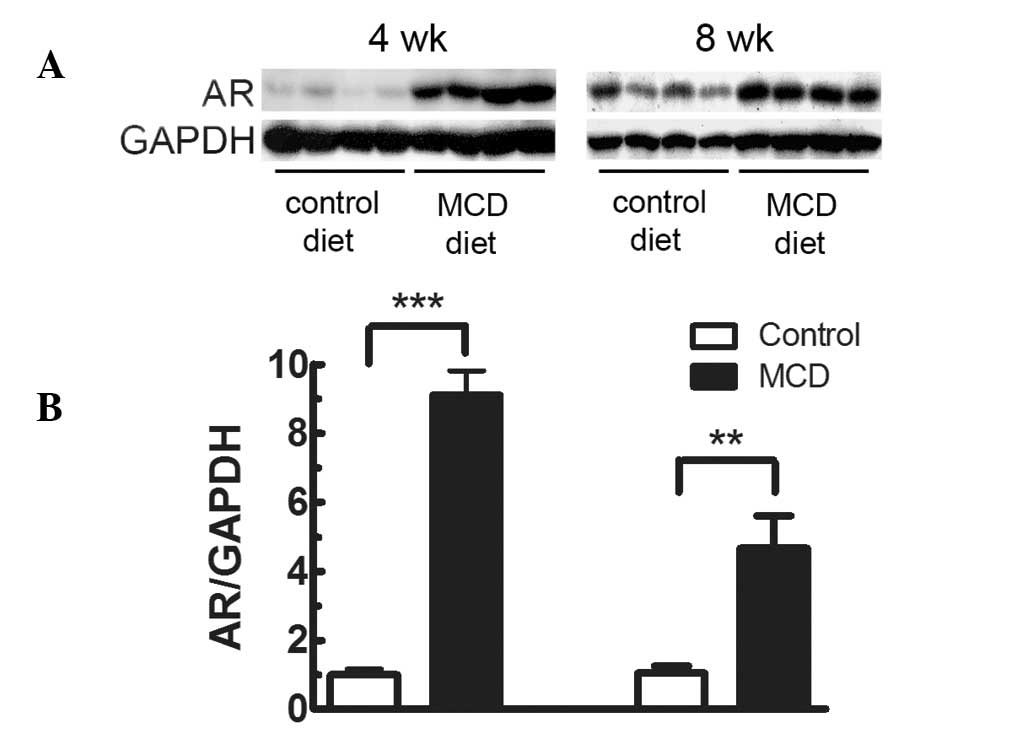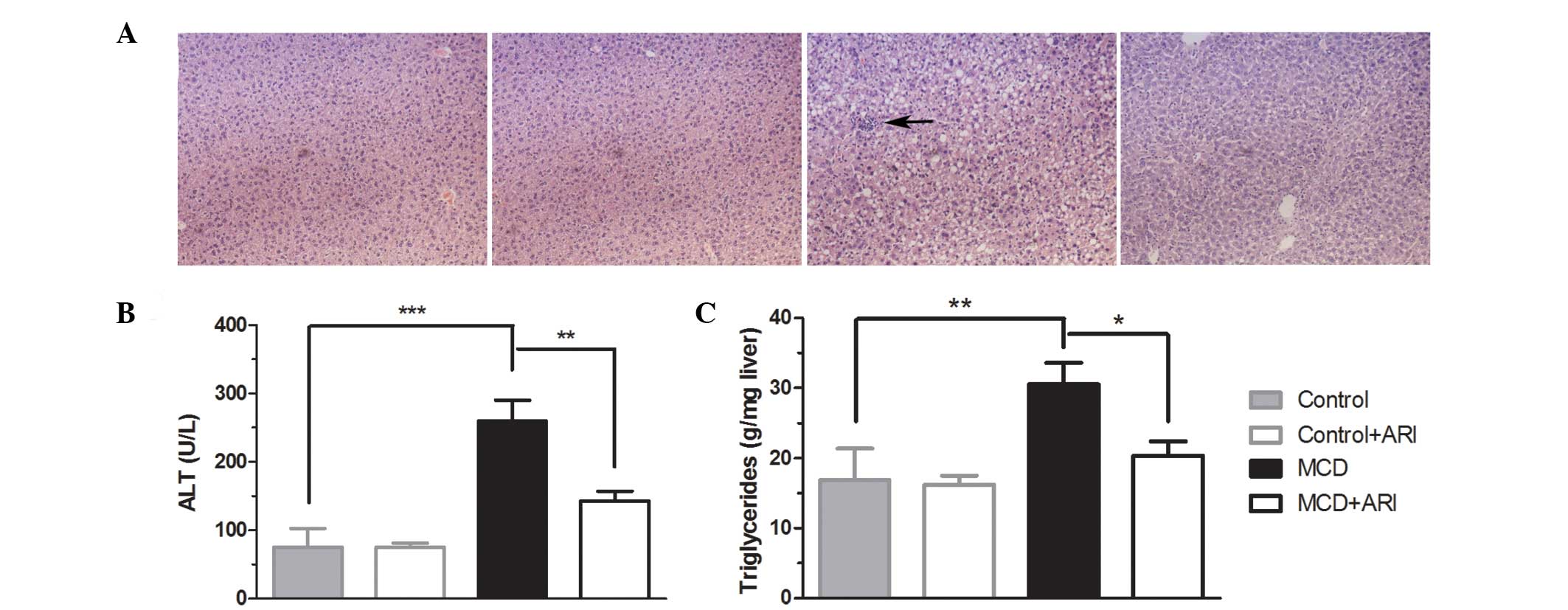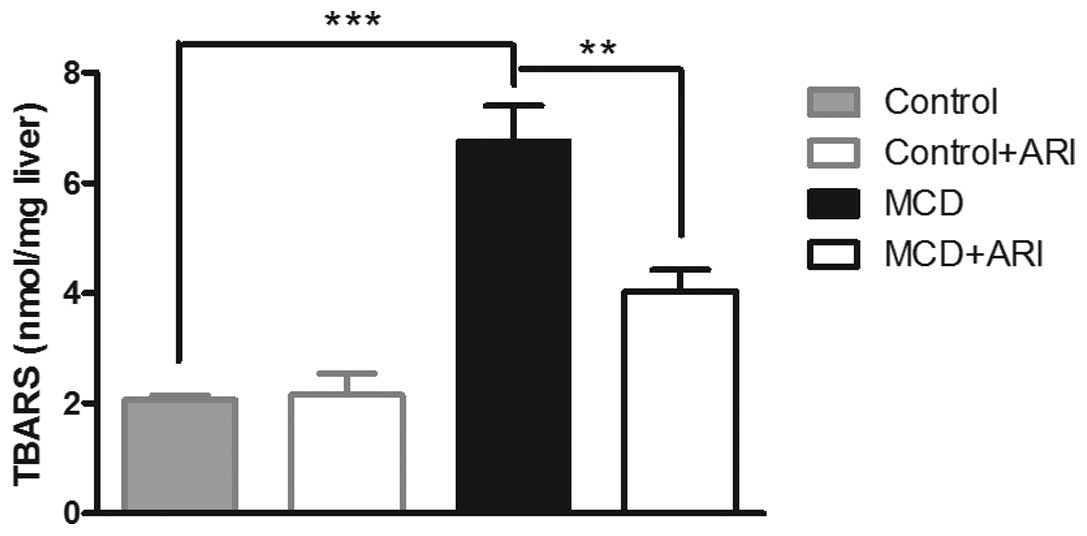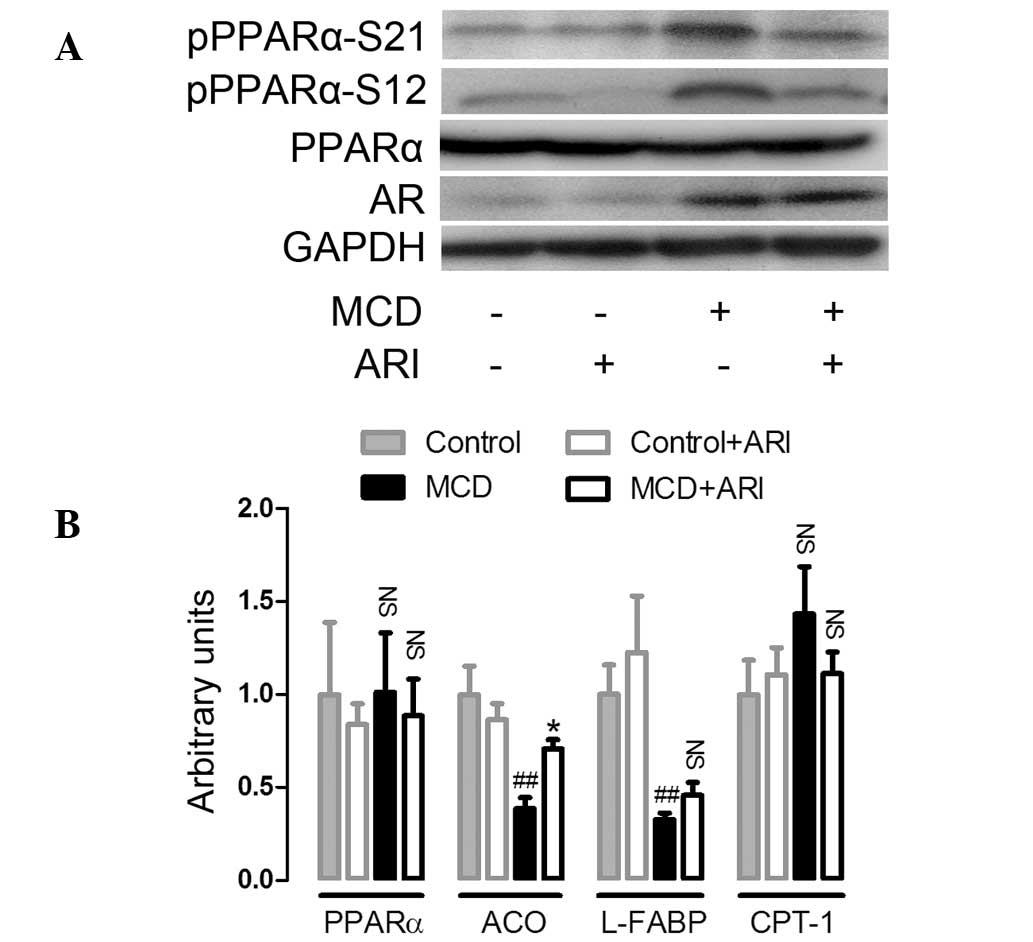|
1
|
Ludwig J, Viggiano TR, McGill DB and Oh
BJ: Nonalcoholic steatohepatitis: Mayo Clinic experiences with a
hitherto unnamed disease. Mayo Clin Proc. 55:434–438.
1980.PubMed/NCBI
|
|
2
|
Day CP and James OF: Steatohepatitis: a
tale of two ‘hits’? Gastroenterology. 114:842–845. 1998.
|
|
3
|
Kota BP, Huang TH and Roufogalis BD: An
overview on biological mechanisms of PPARs. Pharmacol Res.
51:85–94. 2005. View Article : Google Scholar : PubMed/NCBI
|
|
4
|
Abdelmegeed MA, Yoo SH, Henderson LE, et
al: PPARalpha expression protects male mice from high fat-induced
nonalcoholic fatty liver. J Nutr. 141:603–610. 2011. View Article : Google Scholar : PubMed/NCBI
|
|
5
|
Ip E, Farrell G, Hall P, et al:
Administration of the potent PPARalpha agonist, Wy-14,643, reverses
nutritional fibrosis and steatohepatitis in mice. Hepatology.
39:1286–1296. 2004. View Article : Google Scholar : PubMed/NCBI
|
|
6
|
Ip E, Farrell GC, Robertson G, et al:
Central role of PPARalpha-dependent hepatic lipid turnover in
dietary steatohepatitis in mice. Hepatology. 38:123–132. 2003.
View Article : Google Scholar : PubMed/NCBI
|
|
7
|
Clements RS Jr: The polyol pathway. A
historical review. Drugs. 32(Suppl 2): 3–5. 1986. View Article : Google Scholar
|
|
8
|
Brown KE, Broadhurst KA, Mathahs MM, et
al: Immunodetection of aldose reductase in normal and diseased
human liver. Histol Histopathol. 20:429–436. 2005.PubMed/NCBI
|
|
9
|
O’Connor T, Ireland LS, Harrison DJ and
Hayes JD: Major differences exist in the function and
tissue-specific expression of human aflatoxin B1 aldehyde reductase
and the principal human aldo-keto reductase AKR1 family members.
Biochem J. 343:487–504. 1999.PubMed/NCBI
|
|
10
|
Takahashi M, Hoshi A, Fujii J, et al:
Induction of aldose reductase gene expression in LEC rats during
the development of the hereditary hepatitis and hepatoma. Jpn J
Cancer Res. 87:337–341. 1996. View Article : Google Scholar : PubMed/NCBI
|
|
11
|
Qiu L, Lin J, Xu F, et al: Inhibition of
aldose reductase activates hepatic peroxisome
proliferator-activated receptor-α and ameliorates hepatosteatosis
in diabetic db/db mice. Exp Diabetes Res.
2012:7897302012.PubMed/NCBI
|
|
12
|
Qiu L, Wu X, Chau JF, et al: Aldose
reductase regulates hepatic peroxisome proliferator-activated
receptor alpha phosphorylation and activity to impact lipid
homeostasis. J Biol Chem. 283:17175–17183. 2008. View Article : Google Scholar
|
|
13
|
Brunt EM: Nonalcoholic steatohepatitis:
definition and pathology. Semin Liver Dis. 21:3–16. 2001.
View Article : Google Scholar : PubMed/NCBI
|
|
14
|
Sahai A, Malladi P, Pan X, et al: Obese
and diabetic db/db mice develop marked liver fibrosis in a model of
nonalcoholic steatohepatitis: role of short-form leptin receptors
and osteopontin. Am J Physiol Gastrointest Liver Physiol.
287:G1035–G1043. 2004. View Article : Google Scholar : PubMed/NCBI
|
|
15
|
Qiu L, Lin J, Ying M, et al: Aldose
reductase is involved in the development of murine diet-induced
nonalcoholic steatohepatitis. PLoS One. 8:e735912013. View Article : Google Scholar : PubMed/NCBI
|
|
16
|
Lefebvre P, Chinetti G, Fruchart JC and
Staels B: Sorting out the roles of PPAR alpha in energy metabolism
and vascular homeostasis. J Clin Invest. 116:571–580. 2006.
View Article : Google Scholar : PubMed/NCBI
|
|
17
|
Djouadi F, Weinheimer CJ, Saffitz JE, et
al: A gender-related defect in lipid metabolism and glucose
homeostasis in peroxisome proliferator- activated receptor alpha-
deficient mice. J Clin Invest. 102:1083–1091. 1998. View Article : Google Scholar
|
|
18
|
Burns KA and Vanden Heuvel JP: Modulation
of PPAR activity via phosphorylation. Biochim Biophys Acta.
1771:952–960. 2007. View Article : Google Scholar : PubMed/NCBI
|
|
19
|
Gelman L, Michalik L, Desvergne B and
Wahli W: Kinase signaling cascades that modulate peroxisome
proliferator-activated receptors. Curr Opin Cell Biol. 17:216–222.
2005. View Article : Google Scholar : PubMed/NCBI
|
|
20
|
Barger PM, Brandt JM, Leone TC, et al:
Deactivation of peroxisome proliferator-activated receptor-alpha
during cardiac hypertrophic growth. J Clin Invest. 105:1723–1730.
2000. View
Article : Google Scholar : PubMed/NCBI
|
|
21
|
Tamasi V, Miller KK, Ripp SL, et al:
Modulation of receptor phosphorylation contributes to activation of
peroxisome proliferator activated receptor alpha by
dehydroepiandrosterone and other peroxisome proliferators. Mol
Pharmacol. 73:968–976. 2008. View Article : Google Scholar
|
|
22
|
Koek GH, Liedorp PR and Bast A: The role
of oxidative stress in non-alcoholic steatohepatitis. Clin Chim
Acta. 412:1297–1305. 2011. View Article : Google Scholar : PubMed/NCBI
|
|
23
|
Voican CS and Perlemuter G: Insulin
resistance and oxidative stress: two therapeutic targets in
non-alcoholic steatohepatitis. J Hepatol. 54:388–391. 2011.
View Article : Google Scholar : PubMed/NCBI
|
|
24
|
Esterbauer H, Schaur RJ and Zollner H:
Chemistry and biochemistry of 4-hydroxynonenal, malonaldehyde and
related aldehydes. Free Radic Biol Med. 11:81–128. 1991. View Article : Google Scholar : PubMed/NCBI
|
|
25
|
Vander Jagt DL, Kolb NS, Vander Jagt TJ,
et al: Substrate specificity of human aldose reductase:
identification of 4-hydroxynonenal as an endogenous substrate.
Biochim Biophys Acta. 1249:117–126. 1995.PubMed/NCBI
|
|
26
|
Spycher S, Tabataba-Vakili S, O’Donnell
VB, et al: 4-hydroxy-2,3-trans-nonenal induces transcription and
expression of aldose reductase. Biochem Biophys Res Commun.
226:512–516. 1996. View Article : Google Scholar : PubMed/NCBI
|
|
27
|
Rittner HL, Hafner V, Klimiuk PA, et al:
Aldose reductase functions as a detoxification system for lipid
peroxidation products in vasculitis. J Clin Invest. 103:1007–1013.
1999. View
Article : Google Scholar : PubMed/NCBI
|
|
28
|
Ruef J, Liu SQ, Bode C, et al: Involvement
of aldose reductase in vascular smooth muscle cell growth and
lesion formation after arterial injury. Arterioscler Thromb Vasc
Biol. 20:1745–1752. 2000. View Article : Google Scholar : PubMed/NCBI
|
|
29
|
Tracey WR, Magee WP, Ellery CA, et al:
Aldose reductase inhibition alone or combined with an adenosine
A(3) agonist reduces ischemic myocardial injury. Am J Physiol Heart
Circ Physiol. 279:H1447–H1452. 2000.PubMed/NCBI
|
|
30
|
Yadav UC, Ramana KV, Aguilera-Aguirre L,
et al: Inhibition of aldose reductase prevents experimental
allergic airway inflammation in mice. PLoS One. 4:e65352009.
View Article : Google Scholar : PubMed/NCBI
|
|
31
|
Yadav UC, Srivastava SK and Ramana KV:
Aldose reductase inhibition prevents endotoxin-induced uveitis in
rats. Invest Ophthalmol Vis Sci. 48:4634–4642. 2007. View Article : Google Scholar : PubMed/NCBI
|


















